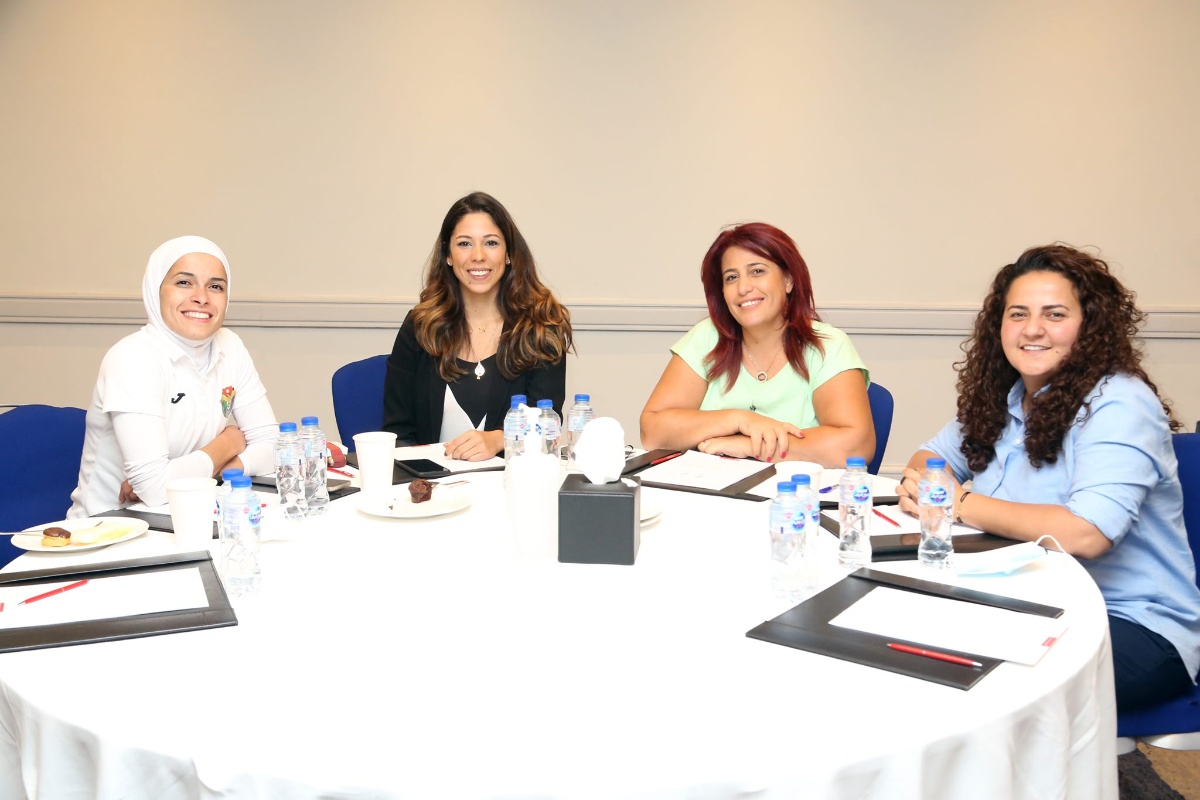As part of the Arbaatein Dialogues series, ARDD’s Al Nahda Women’s Network organized a discussion, under the title “Women in Professional Sports: Challenges and Achievements”, that tackled successes and achievements of Jordanian women athletes, and their ability to overcome difficulties.
Members of the women’s football team were the main speakers at the event, which was moderated by sports journalist Heba Al-Sabbagh.
The discussion highlighted the fact that women proved to rise up to challenges in a professional manner and are perfectly capable of realizing achievements in Arab and Asian arenas, acquiring awards and overcoming negative societal attitudes with confidence and ambition, despite the difficulties they encounter on the way.
The young, promising and professional Jordanian women football players enjoy care and attention, aim high, and do not allow challenges to stand in their way. Women’s practicing sports stands at the basis of their, and society’s, development and is a manifestation of active civic participation. Sports may even help fight poverty and reduce unemployment. Women need it as much as men to boost self-confidence, as physical therapy, and for fitness.
Talking about the success of Jordanian women in sports is accompanied by success in administrative work related to sports as well. As Jordan is the only Asian country where a woman occupies the position of secretary-general of the National Olympic Committee. Jordanian women have successfully headed many sports delegations in international forums, and entered what was a male domain, like training, arbitration, and administrative work in sports federations.
At the beginning of the discussion, Al-Sabbagh said sports are rarely the focus for media, especially women’s sport, and almost impossible to get into for women who do not have adequate support or live far from the capital.
“During my university studies, I wished that Jordan had a women’s football team, and that society accepted women football players; that was achieved in 2005 when women’s football entered Jordan with the support of Prince Ali bin Al Hussein,” said Al-Sabbagh.
Customs and traditions limit the progress of women in sports in Jordan and the Arab world, with most parents preventing their daughters from playing football; there are some exceptions, of course, she added.
Head of women’s football and assistant technical director at the Jordan Football Association (JFA) Soleen Al-Zoubi said women’s football is expected to become more prevalent, with the game witnessing a large turnout of girls, whose number reached close to 1,000 players; she added that Jordan hosted many women’s tournaments, the most important of which the FIFA U-17 Women’s World Cup in 2016, which saw the participation of 16 teams from all over the world.
Al-Zoubi said that sports clubs considered female players “amateurs and not professionals”, but women worked hard to change this view, achieving victories. Now there are 12 promising centers spread throughout the Kingdom governorates , and they give girls wishing to play football the opportunity to do so.
“Today, I am in the Jordan Football Association. I work as an administrator and provide support and assistance to adolescent girls. I also obtained a certificate for football training, and I work as a coach for children,” Al-Zoubi said, stressing the importance of raising school teachers’ awareness about the importance of physical education, specifically football for girls, and the fact that they have the possibility to join women football clubs free of charge due to the support of JFA.
Director of the women’s teams in the Jordanian Federation Sawsan Al-Hasasin, whose one dream was to be part of the national football team said that “the team’s players have a great deal of responsibility, and great capabilities and remarkable professionalism.”
She believes that “the progress and success of Jordanian women’s football must start from scratch by building women’s teams in schools, and then spreading the idea in governorates and large cities, to expand the base of players in Jordan.”
She said that Arab women’s football in North African Arab countries, Egypt, Morocco, and Tunisia, for example, is better organized, than in Arab Asian teams. She also said that Jordan qualified for the first time for the AFC Women’s Nations Cup in 2014 as the first Arab team, and this gives it the impetus to work hard and assert itself in global championships.
Director of Prince Ali Center for Junior Shahnaz Jibreen said that ‘the success that women’s team has achieved is not just the players’, but for all “those who plan, support and follow behind the scenes.”
She said she hoped to see the sport grow in popularity in the Kingdom and expand its base, more support for women’s football, which should be able to compete in world championships and sufficient financial support to build new stadiums, improve the existing infrastructure, and further raise the community’s awareness about the importance of and the difference this sport may make in the life of girls.
The participants contributed comments and recommendations and expressed hope that players, including those with disabilities, will enjoy better conditions and will be provided greater support, urging investing in sports, which is an important investment in developed countries, not only because national teams help boost the reputation and competitiveness of their countries, but also because sports help reduce the health bill of their people.
They also stressed the importance of having women’s sports representatives present at meetings and forums that support women’s participation in civic and political sectors, as well as of giving serious consideration to the players’ wages, especially since they are part of a vital, important and worthy sector. They recommended professional marketing of women football, which does not enjoy the same popularity men’s football does, due to stereotyping or the belief that it is not equally efficient and fun.
Participants also urged the media, the private sector, the civil society, and the Sports Federation to take “seriously” the challenges faced by sports, which are important and help develop discipline, teamwork, and sportsmanship among members of the society.


